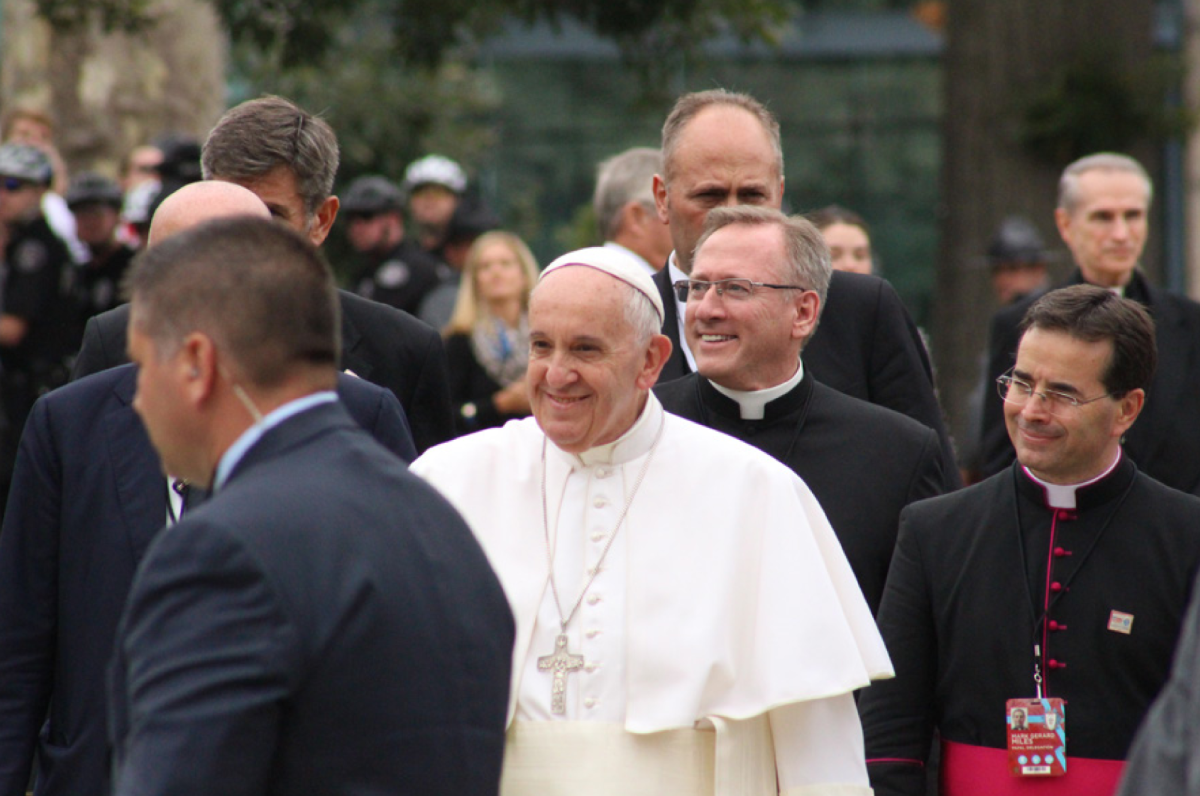The International Relations Program sponsored the panel “Israel and Gaza: Starting Points for Understanding” Nov. 16 in Forum Theatre.
Amber Abbas, Ph.D., associate professor of history and director of the Nealis Program in Asian Studies, and Richard Gioioso, Ph.D., associate professor of political science and director of the International Relations Program, delivered remarks at the event.
The panel was moderated by Nathan Baird, Ph.D., associate professor of chemistry and interim dean of the College of Arts and Sciences, who said in opening remarks that attendees should “commit [themselves] to the learning process” when asking questions.
Abbas’ presentation focused on the historical context for the current conflict. Gioioso’s presentation analyzed the conflict through the lens of “power politics,” an international relations theory that views imbalances of power as a central cause for conflict.
“When power is imbalanced in the international system, the probability of war is high,” Gioioso said.
Their presentations offered different lenses to view the conflict, but Abbas said she and Gioioso both had a united goal.
“It was our goal to present reliable, useful information as opposed to information that is driven by bias, polemic or self interest,” Abbas said in an interview with The Hawk. “That does not mean that we don’t have feelings, but that our responsibility as educators is to provide information for learning and understanding.”
Gioioso acknowledged there are multiple understandings of the conflict, even within the lens of international relations.
“I only presented one framework, but there are various frameworks to explain what’s happening in the world,” Gioioso said in an interview with The Hawk. “That’s not justifying it or not, and this has nothing to do with agreeing with it, but rather just explaining it.”
Building on what he had said during the panel, Gioioso emphasized the divisive effects social media can have on people who are uninformed about the conflict.
“There are filters wandering around on Instagram and on TikTok that are endorsing certain sides of the conflict and performing advocacy or activism in favor of either Israel or Palestinians,” Gioioso said. “How do you even understand that if you don’t know what the Israeli-Palestinian conflict is?”
Abbas said the issue was particularly personal for her, as she has “lived with this conflict [her] entire life.” Growing up in Saudi Arabia, Abbas said she has both Palestinian friends whose families have been displaced and Israeli family members who have been affected by the recent violence.
“I had a hard time speaking with my classes and with my students about this because I was afraid that my feelings were too big for me to be able to do my job as a teacher,” Abbas said.
Gioioso said he believes it is important to address this conflict now, as events unfold in real time.
“In the middle of a conflict is a perfect time to address the issue in my opinion because we are surrounded by news and our media sphere is focused [on] aspects of the conflict or dimensions of the conflict,” Gioioso said. “It’s really important to have a conversation about it. I will listen to what anyone has to say and consider it in classes.”
The panel ended with only a few minutes for questions. Event attendees were invited to either ask their questions to the panelists directly or to anonymously submit questions on index cards.
Caitlin Curran ’27, an international relations major who is currently in one of Gioioso’s classes, said the presentation was great but that she would like to have “a second one of these entirely devoted to questions.”
Abbas said she was open to continuing the discussion in a number of different ways, such as organizing another panel at the University City campus and holding informal Q&A sessions.
“We take that idea of the starting point very seriously, so we hope that there are many more points where we can continue thinking,” Abbas said.
Alec Mettin ’24, president of University Student Senate, who attended the panel, echoed this sentiment.
“I believe it is important that we, as a university, provide a safe space for this discussion to continue for individuals — whether they be students, staff, faculty or administration — who desire to learn with others,” Mettin wrote in response to written questions from The Hawk. “I hope to be able to provide such an option in the future.”
Cheryl A. McConnell, Ph.D., president of St. Joe’s, who attended the panel, said she hopes the university will continue to host meaningful conversations about difficult topics.
“I’m really proud of our university for examining a conflict that is so complicated and framing it as a Jesuit university should,” McConnell said. “We’re not shouting at or attacking each other but are respectfully listening and learning. As I meet and talk with other university presidents, they’re honest about the combative nature that is playing out on their campuses. I’m deeply proud of our community.”
Allie Miller ’24 contributed to this story.








































